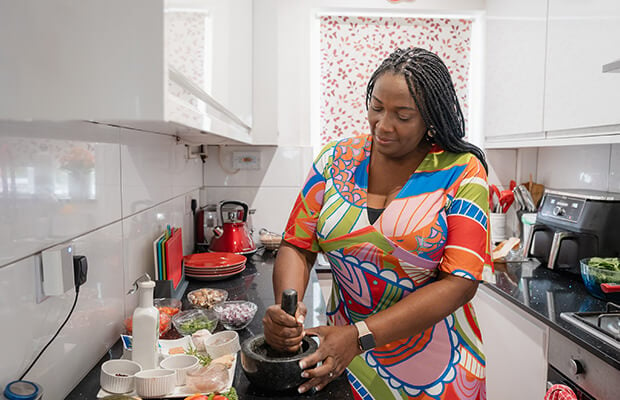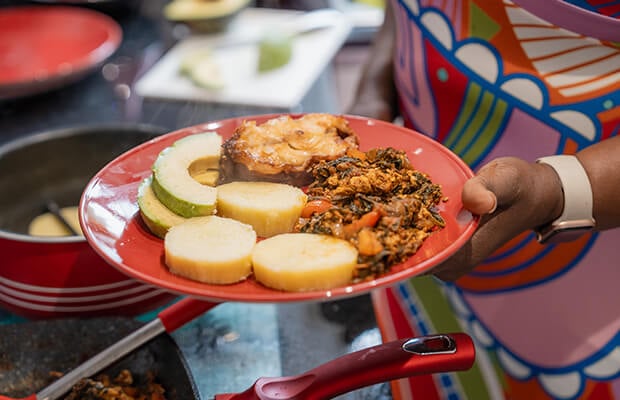For many people, being told you have a risk factor for heart and circulatory disease, such as high blood pressure or high cholesterol, can be a turning point. Joyce from British Heart Foundation's health content team talks about facing her diagnosis:
"I always thought I was healthy, until a routine visit to a health clinic about 15 years ago. When the nurse told me I had high blood pressure I thought something must be wrong with the machine. Or maybe it was because I'd been rushing to get there from work. She told me to see my GP, but I was in denial and just carried on with life.
A few months later I had to go for a procedure at the dentist, for which he had to take my blood pressure. He took several readings and each time it was high. He said he would not do the procedure until I'd seen my GP. I burst into tears. Both my parents, back in Ghana, had high blood pressure but they had been diagnosed in their 60s. I was in my 30s, my children were six and eight, and I thought, 'I'm too young for this'.
My father had two strokes in his 60s which left him with limited mobility in one leg. I had memories of his bags of medication. All that was playing on my mind when I was diagnosed. I was scared and thought 'I'm not going to live a normal life anymore'.
Watch Joyce talk about her experience in this Live & Ticking webinar:
Facing my fear

My husband, who was a doctor, pushed me to see the GP, who put me on medication to lower my blood pressure. It was hard because I've always hated taking pills. But within a week of taking the medication, my blood pressure had dropped to mostly normal levels.
It took time to find the right medication for me, with my GP's help. The first three I tried gave me side effects: headaches, dizziness and swelling in my feet. I finally found a fourth one that worked for me, with no side effects. For the last few years I've been careful to take it every day. I also check my blood pressure at home.
The GP also did a blood test that showed I had high cholesterol. The doctor suggested changes I could make to my lifestyle to help improve this.
The good news is there are things you can do to reduce your risk
Looking back, I see how lucky I was that my high blood pressure and cholesterol, which are risk factors for heart attacks and strokes, were caught early. I have since started working at BHF and have educated myself by reading a lot of BHF booklets and online information.
There are some things that put you more at risk that you cannot change: for example, high blood pressure is more common in Black people in the UK. But the good news is there are things you can do to reduce your risk.
Making healthy food tasty

To help lower my blood pressure, I've cut back on the salt in my diet. I stopped adding salt at the table and use low-salt stock cubes instead of regular ones.
In Ghana, we eat a lot of salted dried fish. Now, I soak the fish in water first to wash off some of the salt, and I just use a little to add traditional flavour, instead of using the whole fish.
To make up for the reduced salt, I use more spices. I grind my own spice mix with cumin, cloves, fennel seed, rosemary and African nutmeg or make a spice paste with fresh ginger and onions.
I was used to my culture's way of cooking, which is deep-frying with a lot of red palm oil. That's high in saturated fat, which can increase cholesterol levels. It might have made sense in the past when people in Ghana would have been on their feet all day, farming, walking or doing chores, and they needed a diet high in energy. But now we're living much less active lives.
I got rid of my deep fryer and started using the oven, and later an air fryer, to grill food instead. When I started grilling meat and chicken, I'd see the fat come off. I'd think: 'Goodness, that's what I had been putting into myself'. Now I remove the skin from chicken and mostly use unsaturated fats such as sunflower oil.
It did not take long for me to get used to this new way of eating. When I visited my family in Ghana, I'd cook for them and they'd rave over my food, asking me to show them how I did it.
Positive steps to better health

Within a few months of first visiting my GP, I’d been able to bring my cholesterol levels back within the normal range. I did this through exercise as well as making changes to my diet. I got myself a home exercise bike and I signed myself up to a 10,000-steps-a-day challenge.
More recently, I've found a good way to keep up my step count is through gardening. Sometimes I'll be out in the garden for an hour, I'll look at my wearable step counter and I'm already at 6,000 steps.
I started gardening after my husband passed away, the year before the Covid pandemic began. He loved the garden and so I did it in his memory. I decided to try growing my own fruit and vegetables, like we had when I was a child.
It's such a joy eating something you've grown from seed
I first tried tomatoes and soon went crazy growing dozens of things. It's got me eating a lot more fruit and vegetables than before. It's such a joy eating something you've grown from a tiny seed, and to me they taste better fresh from the garden.
Making healthy changes to my life has not just helped me keep my blood pressure and cholesterol under control. It's given me the chance to influence my friends and family. My son is studying to be a physiotherapist and goes to the gym regularly. My daughter is always showing me healthy recipes she's found and exercising in her room with online videos. Hopefully they'll carry on leading healthy lives."
Want to get fit and healthy?
Sign up to our fortnightly Heart Matters newsletter to receive healthy recipes, new activity ideas, and expert tips for managing your health. Joining is free and takes two minutes.
I’d like to sign-up
Joyce's tips for growing your own fruit and veg

-
If you don't have a garden, use your windowsills.
Start off with pots of easy-to-grow herbs that last through the year such as rosemary or thyme. Use these to add flavour to food instead of salt.
-
Grow what you enjoy eating and choose plants that produce a lot of veg or fruit.
An individual carrot takes a long time to grow, but I love growing tomatoes as one plant gives lots of tomatoes over several weeks. I get so many that I freeze some to blend into sauces later. Spinach is good too because I can cut some leaves from the plant and it will grow back more. It's also high in nitrates and potassium – which can be helpful for lowering blood pressure. And strawberry plants come back year after year.
-
Think 'location, location, location'.
Find out if your plant needs a lot or less sunshine. I like to grow my vegetables in raised planter boxes right beside my kitchen. This means I'll notice weeds and do some weeding when I have a few spare minutes. And it's easy to grab some spinach for my stews or omelettes. If you have a spot that's warm and sunny, you can even grow some plants like dwarf tomatoes inside.
Tried this at home?
Have you followed any of the tips in this article? Or do you have a healthy tip to share? Email your thoughts and any photos for a chance to be featured in the next magazine.
What to read next...
